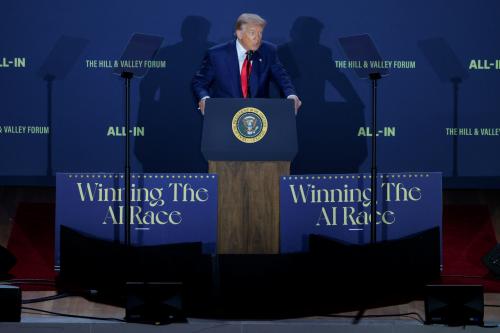Editor’s Note: In an interview with NPR’s All Things Considered, Kenneth Pollack spoke about a recent war game he conducted regarding the United States and Iran.
ROBERT SIEGEL, HOST: There was another exercise in Washington last week that involved Iran, the U.S. and the impasse over the Iranian nuclear program. The Brookings Institution staged a war game. No real weapons were used, but teams playing the roles of U.S. and Iranian policymakers were presented with a hypothetical but not very far-fetched scenario, and the results were not encouraging. Kenneth Pollack is a senior fellow in the Saban Center for Middle East Policy at the Brookings Institution, and he ran this exercise and joins us. Good to see you again.
KENNETH POLLACK: Very good to be back.
SIEGEL: First, you’re not identifying the people who took part in the game, but can you at least describe what kind of people they were?
POLLACK: Sure. On the American side, we brought together of about a dozen former very senior American officials, people who have actually occupied the roles in reality that they were asked to play in the game. On the Iranian side, it was a little bit different. We obviously don’t have access to, honest to goodness, former Iranian policymakers. So what we had to do there was rely on Iranian-American and American experts on Iran, a number of whom had some experience in the U.S. government, but obviously somewhat different from our American team.
SIEGEL: They are presented with this scenario that you wrote, which included cyber attacks, assassinations of scientists, and it escalated from there. When you wrote all of this, did you write it in a way that you thought it was at least possible that diplomacy might prevail over threats of war?
POLLACK: Absolutely. The idea was to test some basic hypotheses about where the United States and Iran might be going. And we allowed for the scenario to move in any of several dozen different directions, some of which were entirely pacific, some were entirely bellicose and others that were a mix of the two. And some of the interesting things that came out of the game was that there were some key moments were if one team or the other had done something slightly differently, according to the other team, they would’ve had a peaceful response instead of what actually happened.
The Brookings Institution is committed to quality, independence, and impact.
We are supported by a diverse array of funders. In line with our values and policies, each Brookings publication represents the sole views of its author(s).



Commentary
Simulated War Between U.S.-Iran Has Grisly End
September 24, 2012